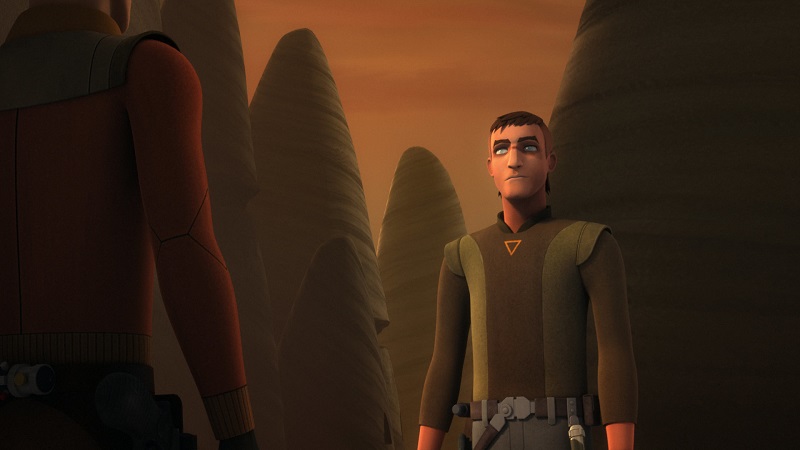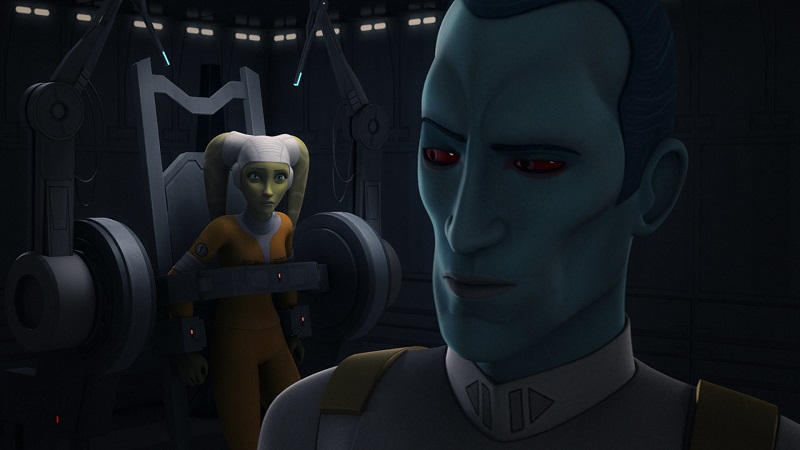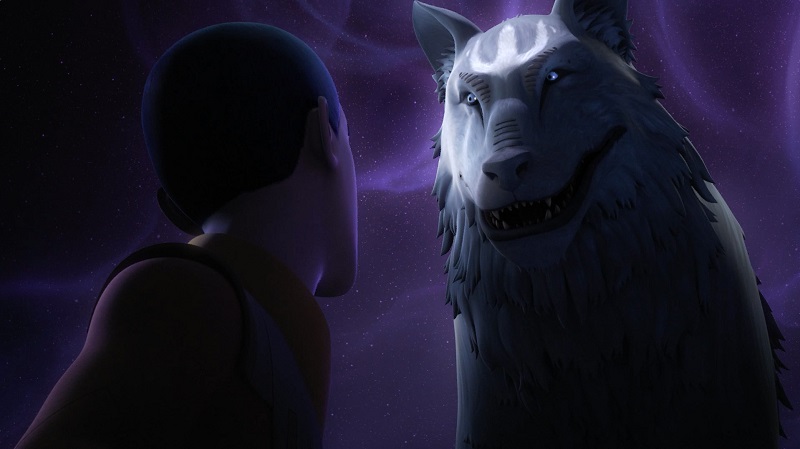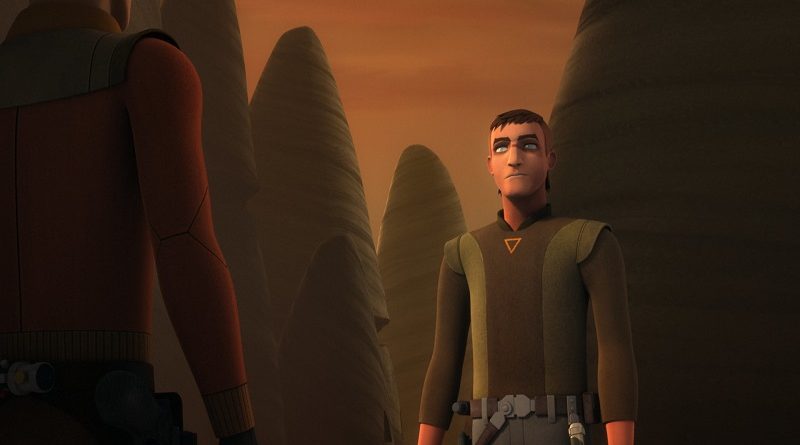Star Wars Rebels: Jedi Night and DUME Review
 Star Wars Rebels marked the beginning of its final seven episodes with the death of Kanan Jarrus. While an emotional blow to nearly all fans of the show, Kanan’s passing was not nearly as impactful or striking as the last high profile “death” on Rebels: Ahsoka Tano’s curious descent into the underworld in a striking montage that concluded the show’s second season finale. For Tano, her figurative death was built upon a highly anticipated reckoning between the rogue Force user and her one time Jedi Master, Anakin Skywalker now Darth Vader. That moment was built with an intensity of the moment, music, and everything that came before it. By contrast, “Jedi Night” ended much in the same way as one easing into an uncomfortable, but expected, situation.
Star Wars Rebels marked the beginning of its final seven episodes with the death of Kanan Jarrus. While an emotional blow to nearly all fans of the show, Kanan’s passing was not nearly as impactful or striking as the last high profile “death” on Rebels: Ahsoka Tano’s curious descent into the underworld in a striking montage that concluded the show’s second season finale. For Tano, her figurative death was built upon a highly anticipated reckoning between the rogue Force user and her one time Jedi Master, Anakin Skywalker now Darth Vader. That moment was built with an intensity of the moment, music, and everything that came before it. By contrast, “Jedi Night” ended much in the same way as one easing into an uncomfortable, but expected, situation.
Perhaps it was this expectation hanging over Kanan’s fate which slightly soured what should have been one of the biggest, if not the biggest, death in the show’s four seasons. From the very first episode, the existence of a major Jedi character created an anxiety looming over Kanan’s head, created by the prevalent understanding that, for all intents and purposes, the Jedi are gone and wiped out by the time of Luke Skywalker only a few years down the hyperspace road. Previously this anxiety heightened moments when Kanan’s life was actually threatened, such as his duel with the Grand Inquisitor in Season One’s finale or his face off with Maul in the same finale that decided Ahsoka’s fate. In the fourth and final season, most viewers instinctively knew and feared that the Jedi Knight would likely die to give strength to Yoda’s words to Skywalker on Dagobah. Furthermore, the decision to finally push the romantic elements of Kanan’s and Hera Syndulla’s relationship to the forefront of their interactions only primed expectations that a death was imminent. And the death was flagged from the very beginning of the episode in two other specific ways.
Grand Admiral Thrawn’s presence in “Jedi Night” involves returning Hera’s family Kalikori to the game board, its reappearance providing viewers with the first nudge that a death was incoming. That is not to say his presence was not enjoyable, but he appears in the midst of Governor Pryce torturing Hera in preparation for interrogation to flaunt the Kalikori before the captured rebel general and to note how it marked the death of a loved one in Hera’s life. Ostensibly, Thrawn does this to reassure Syndulla that the heirloom is in good hands. This felt out of character for Thrawn, taking the step of bringing the item from his Star Destroyer and then to leave an allegedly important art piece behind. Nonetheless, this was one of our hints that someone important to Hera would soon die and become a potential new addition to the Kalikori.
 Elsewhere on Lothal, as the rebels prepare for their rescue attempt masterminded by Ezra Bridger, we are given a montage of those preparations by the others while Kanan goes through something akin to a purification ritual. He cuts his hair and shaves off his beard. During this montage the episode stumbles with the musical cue: it’s an almost upbeat score, fitting for the work of preparing for the mission, but oddly paired to scenes of someone preparing for their possible death. The music was a missing soberness that should come when someone is taking such steps, and it undermined the momentous occasion to come.
Elsewhere on Lothal, as the rebels prepare for their rescue attempt masterminded by Ezra Bridger, we are given a montage of those preparations by the others while Kanan goes through something akin to a purification ritual. He cuts his hair and shaves off his beard. During this montage the episode stumbles with the musical cue: it’s an almost upbeat score, fitting for the work of preparing for the mission, but oddly paired to scenes of someone preparing for their possible death. The music was a missing soberness that should come when someone is taking such steps, and it undermined the momentous occasion to come.
Finally, there remains one other piece to why Kanan’s death did not quite hit the mark: the Loth-wolves. In “Rebel Assault,” the previous episode in which Hera was captured, Kanan uncharacteristically chooses not to rescue her. He makes this decision after an “off camera” conversation with one of the mystical Loth-wolves. This is frustrating because it introduces unfinished business with the character. We know that something was said and communicated which put Kanan on the path that he takes in that episode and in “Jedi Night,” but we don’t quite know what it is, other than it obviously has to be extremely important. At the time of Kanan’s death, that reason has not been made clear and that void, that missing information, makes the death feel incomplete. Throw in a dash of a Loth-wolf running around and saying Kanan’s original name, Dume, and the ability for viewers to accept his death is weakened significantly by the promise of future reward. A death on this level needed one of two things: either an immediate follow-through to fill in that missing information, or enough of that information up front as a better promise to the fans to hang in there and trust the writers. This problem would not be here if we had the latter option and in the the follow-up episode, which should have served the former purpose, we get only more mystery.
“DUME” at least appreciates the effect of Kanan’s death on his family. Hera spends much of the time dealing with the loss of someone she has long loved, but only chose to romantically acknowledge just before death. The degree to how this was handled really depends on how the viewer understands her character. For the other characters, Sabine and Zeb plot revenge while Ezra gets chased by Loth-wolves. Ultimately Ezra has a vision meeting with a giant Loth-wolf who references Kanan and, like a spiritual guide, imparts a new quest upon the young Jedi. We are teased about the connection between this massive Loth-wolf and Kanan as Ezra senses his departed master when it arrives, and it literally tells us we should pay attention to it with a grumbled snarled “Dume.” In the end, “DUME” the episode fails to give meaning to Kanan’s death outside of how it affected the other surviving rebels.
 Another problem other than Jarrus’ death also arose in “Jedi Night” – how Hera Syndulla’s character was treated by the writers. In short, the rebel general had little to no agency throughout the episode. Her first appearance is designed mainly to highlight the cruel nature of Governor Pryce, who takes visibly glee in torturing her prisoner. Then after Hera is injected with the Imperial mind probe’s truth serum, sje is subjected to a drugged state generally for comedic purposes while being rescued by Kanan. Twitter user Xena Duncan points out the multiple problems with this approach in a must-read series of tweets, which reflect on how terrible the experience of being drugged against one’s will truly is – it is the opposite of comedic – and how the writers ruined the most dramatic moment in the episode, not Kanan’s death but Hera’s admission of love for him. The honesty of the moment that many fans have waited for over a number of years is undermined by the possibility that it’s a confession shared because of the drug, despite what Hera says at that moment in the episode. Even when Hera assumes the role of pilot on the glider, it’s Kanan who tells her where to land, echoing past problems in the series. We can only hope for better writing for Hera going forward into the conclusion of Rebels.
Another problem other than Jarrus’ death also arose in “Jedi Night” – how Hera Syndulla’s character was treated by the writers. In short, the rebel general had little to no agency throughout the episode. Her first appearance is designed mainly to highlight the cruel nature of Governor Pryce, who takes visibly glee in torturing her prisoner. Then after Hera is injected with the Imperial mind probe’s truth serum, sje is subjected to a drugged state generally for comedic purposes while being rescued by Kanan. Twitter user Xena Duncan points out the multiple problems with this approach in a must-read series of tweets, which reflect on how terrible the experience of being drugged against one’s will truly is – it is the opposite of comedic – and how the writers ruined the most dramatic moment in the episode, not Kanan’s death but Hera’s admission of love for him. The honesty of the moment that many fans have waited for over a number of years is undermined by the possibility that it’s a confession shared because of the drug, despite what Hera says at that moment in the episode. Even when Hera assumes the role of pilot on the glider, it’s Kanan who tells her where to land, echoing past problems in the series. We can only hope for better writing for Hera going forward into the conclusion of Rebels.
One female character who did benefit over the course of the back-to-back episodes was Governor Pryce. To best appreciate the character of Arhinda Pryce requires a reading of Timothy Zahn’s Thrawn, which provides her background as someone driven by Imperial injustice to find power, only to succumb to the same moral decay. Pryce’s introduction in “Jedi Night,” thrilled with torturing Hera, reveals how far the governor of Lothal has fallen in her pursuit of eliminating the rebel presence from her planet. As we learn in Thrawn, by the time of Rebels, Pryce has come to the conclusion that to save Lothal, she must make it important to the Empire and to do this, the planet needs Imperial infrastructure. In “DUME” her bloodlust for personal revenge overcomes her senses and she makes an order that destroys the planet’s fuel supplies – and in the process essentially kills the very armament factory that made Lothal vital. At the same time, there’s a hint toward her future fate: the last time a subordinate officer of Thrawn’s sought personal victory, Thrawn’s plans failed and that individual, Admiral Konstantine, died.
“Jedi Night” and “DUME” represent a flawed return for Rebels and a disappointing execution of what represented pinnacle moments of two of its major characters. With only two nights and five episodes left, the likelihood of the show sticking an admittedly difficult landing is a little less so. Perhaps when the final episodes of the show can be watched all at once, experienced as one uninterrupted story, how the episodes work will improve. But for now, problems persist and hopefully disappear going forward.
- Star Wars The Mandalorian – The Reckoning and Redemption Review - January 15, 2020
- Star Wars: The Mandalorian –The Prisoner Review - January 11, 2020
- Star Wars Resistance – Station to Station Review - January 7, 2020











